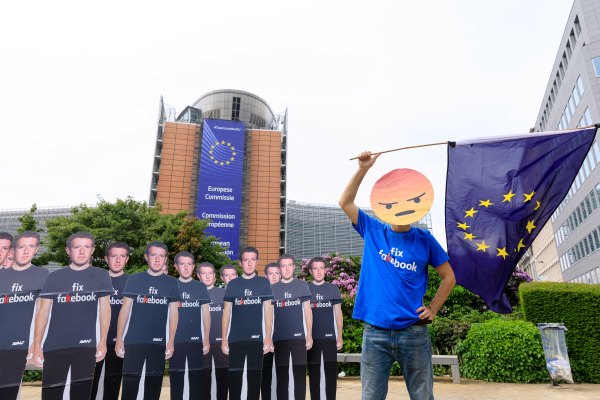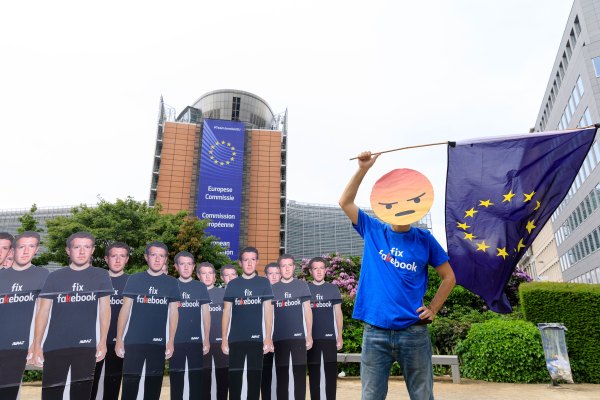Facebook pushes EU for dilute and fuzzy internet content rules


Facebook founder Mark Zuckerberg is in Europe this week — attending a security conference in Germany over the weekend, where he spoke about the kind of regulation he’d like applied to his platform, ahead of a slate of planned meetings with digital heavyweights at the European Commission.
“I do think that there should be regulation on harmful content,” said Zuckerberg during a Q&A session at the Munich Security Conference, per Reuters, making a pitch for bespoke regulation.
He went on to suggest “there’s a question about which framework you use,” telling delegates: “Right now there are two frameworks that I think people have for existing industries — there’s like newspapers and existing media, and then there’s the telco-type model, which is ‘the data just flows through you,’ but you’re not going to hold a telco responsible if someone says something harmful on a phone line.”
“I actually think where we should be is somewhere in between,” he added, making his plea for internet platforms to be a special case.
At the conference he also said Facebook now employs 35,000 people to review content on its platform and implement security measures — including suspending around 1 million fake accounts per day, a stat he professed himself “proud” of.
The Facebook chief is due to meet with key commissioners covering the digital sphere this week, including competition chief and digital EVP Margrethe Vestager, internal market commissioner Thierry Breton and Věra Jourová, who is leading policymaking around online disinformation.
The timing of his trip is clearly linked to digital policymaking in Brussels — with the Commission due to set out its thinking around the regulation of artificial intelligence this week. (A leaked draft last month suggested policymakers are eyeing risk-based rules to wrap around AI.)
More widely, the Commission is wrestling with how to respond to a range of problematic online content — from terrorism to disinformation and election interference — which also puts Facebook’s 2 billion+ social media empire squarely in regulators’ sights.
Another policymaking plan — a forthcoming Digital Service Act (DSA) — is slated to upgrade liability rules around internet platforms.
The details of the DSA have yet to be publicly laid out, but any move to rethink platform liabilities could present a disruptive risk for a content-distributing giant such as Facebook.
Going into meetings with key commissioners Zuckerberg made his preference for being considered a “special” case clear — saying he wants his platform to be regulated not like the media businesses which his empire has financially disrupted; nor like a dumbpipe telco.
On the latter it’s clear — even to Facebook — that the days of Zuckerberg being able to trot out his erstwhile mantra that “we’re just a technology platform,” and wash his hands of tricky content stuff, are long gone.
Russia’s 2016 foray into digital campaigning in the U.S. elections and sundry content horrors/scandals before and since have put paid to that — from nation state-backed fake news campaigns to live-streamed suicides and mass murder.
Facebook has been forced to increase its investment in content moderation. Meanwhile, it announced a News section launch last year — saying it would hand-pick publishers’ content to show in a dedicated tab.
The “we’re just a platform” line hasn’t been working for years. And EU policymakers are preparing to do something about that.
With regulation looming, Facebook is now directing its lobbying energies into trying to shape a policymaking debate — calling for what it dubs “the ‘right’ regulation.”
Here the Facebook chief looks to be applying a similar playbook as Google’s CEO, Sundar Pichai — who recently tripped to Brussels to push for AI rules so dilute they’d act as a tech enabler.
In a blog post published today Facebook pulls its latest policy lever: putting out a white paper which poses a series of questions intended to frame the debate at a key moment of public discussion around digital policymaking.
Top of this list is a push to foreground focus on free speech, with Facebook questioning “how can content regulation best achieve the goal of reducing harmful speech while preserving free expression?” — before suggesting more of the same: (Free, to its business) user-generated policing of its platform.
Another suggestion it sets out which aligns with existing Facebook moves to steer regulation in a direction it’s comfortable with is for an appeals channel to be created for users to appeal content removal or non-removal. Which of course entirely aligns with a content decision review body Facebook is in the process of setting up — but which is not in fact independent of Facebook.
Facebook is also lobbying in the white paper to be able to throw platform levers to meet a threshold of “acceptable vileness” — i.e. it wants a proportion of law-violating content to be sanctioned by regulators — with the tech giant suggesting: “Companies could be incentivized to meet specific targets such as keeping the prevalence of violating content below some agreed threshold.”
It’s also pushing for the fuzziest and most dilute definition of “harmful content” possible. On this Facebook argues that existing (national) speech laws — such as, presumably, Germany’s Network Enforcement Act (aka the NetzDG law) which already covers online hate speech in that market — should not apply to Internet content platforms, as it claims moderating this type of content is “fundamentally different.”
“Governments should create rules to address this complexity — that recognize user preferences and the variation among internet services, can be enforced at scale, and allow for flexibility across language, trends and context,” it writes — lobbying for maximum possible leeway to be baked into the coming rules.
“The development of regulatory solutions should involve not just lawmakers, private companies and civil society, but also those who use online platforms,” Facebook’s VP of content policy, Monika Bickert, also writes in the blog.
“If designed well, new frameworks for regulating harmful content can contribute to the internet’s continued success by articulating clear ways for government, companies, and civil society to share responsibilities and work together. Designed poorly, these efforts risk unintended consequences that might make people less safe online, stifle expression and slow innovation,” she adds, ticking off more of the tech giant’s usual talking points at the point policymakers start discussing putting hard limits on its ad business.
Facebook Faces Yet Another Outage: Platform Encounters Technical Issues Again

Uppdated: It seems that today’s issues with Facebook haven’t affected as many users as the last time. A smaller group of people appears to be impacted this time around, which is a relief compared to the larger incident before. Nevertheless, it’s still frustrating for those affected, and hopefully, the issues will be resolved soon by the Facebook team.
Facebook had another problem today (March 20, 2024). According to Downdetector, a website that shows when other websites are not working, many people had trouble using Facebook.
This isn’t the first time Facebook has had issues. Just a little while ago, there was another problem that stopped people from using the site. Today, when people tried to use Facebook, it didn’t work like it should. People couldn’t see their friends’ posts, and sometimes the website wouldn’t even load.
Downdetector, which watches out for problems on websites, showed that lots of people were having trouble with Facebook. People from all over the world said they couldn’t use the site, and they were not happy about it.
When websites like Facebook have problems, it affects a lot of people. It’s not just about not being able to see posts or chat with friends. It can also impact businesses that use Facebook to reach customers.
Since Facebook owns Messenger and Instagram, the problems with Facebook also meant that people had trouble using these apps. It made the situation even more frustrating for many users, who rely on these apps to stay connected with others.
During this recent problem, one thing is obvious: the internet is always changing, and even big websites like Facebook can have problems. While people wait for Facebook to fix the issue, it shows us how easily things online can go wrong. It’s a good reminder that we should have backup plans for staying connected online, just in case something like this happens again.
Christian family goes in hiding after being cleared of blasphemy

LAHORE, Pakistan — A court in Pakistan granted bail to a Christian falsely charged with blasphemy, but he and his family have separated and gone into hiding amid threats to their lives, sources said.
Haroon Shahzad, 45, was released from Sargodha District Jail on Nov. 15, said his attorney, Aneeqa Maria. Shahzad was charged with blasphemy on June 30 after posting Bible verses on Facebook that infuriated Muslims, causing dozens of Christian families in Chak 49 Shumaali, near Sargodha in Punjab Province, to flee their homes.
Lahore High Court Judge Ali Baqir Najfi granted bail on Nov. 6, but the decision and his release on Nov. 15 were not made public until now due to security fears for his life, Maria said.
Shahzad told Morning Star News by telephone from an undisclosed location that the false accusation has changed his family’s lives forever.
“My family has been on the run from the time I was implicated in this false charge and arrested by the police under mob pressure,” Shahzad told Morning Star News. “My eldest daughter had just started her second year in college, but it’s been more than four months now that she hasn’t been able to return to her institution. My other children are also unable to resume their education as my family is compelled to change their location after 15-20 days as a security precaution.”
Though he was not tortured during incarceration, he said, the pain of being away from his family and thinking about their well-being and safety gave him countless sleepless nights.
“All of this is due to the fact that the complainant, Imran Ladhar, has widely shared my photo on social media and declared me liable for death for alleged blasphemy,” he said in a choked voice. “As soon as Ladhar heard about my bail, he and his accomplices started gathering people in the village and incited them against me and my family. He’s trying his best to ensure that we are never able to go back to the village.”
Shahzad has met with his family only once since his release on bail, and they are unable to return to their village in the foreseeable future, he said.
“We are not together,” he told Morning Star News. “They are living at a relative’s house while I’m taking refuge elsewhere. I don’t know when this agonizing situation will come to an end.”
The Christian said the complainant, said to be a member of Islamist extremist party Tehreek-e-Labbaik Pakistan and also allegedly connected with banned terrorist group Lashkar-e-Jhangvi, filed the charge because of a grudge. Shahzad said he and his family had obtained valuable government land and allotted it for construction of a church building, and Ladhar and others had filed multiple cases against the allotment and lost all of them after a four-year legal battle.
“Another probable reason for Ladhar’s jealousy could be that we were financially better off than most Christian families of the village,” he said. “I was running a successful paint business in Sargodha city, but that too has shut down due to this case.”
Regarding the social media post, Shahzad said he had no intention of hurting Muslim sentiments by sharing the biblical verse on his Facebook page.
“I posted the verse a week before Eid Al Adha [Feast of the Sacrifice] but I had no idea that it would be used to target me and my family,” he said. “In fact, when I came to know that Ladhar was provoking the villagers against me, I deleted the post and decided to meet the village elders to explain my position.”
The village elders were already influenced by Ladhar and refused to listen to him, Shahzad said.
“I was left with no option but to flee the village when I heard that Ladhar was amassing a mob to attack me,” he said.
Shahzad pleaded with government authorities for justice, saying he should not be punished for sharing a verse from the Bible that in no way constituted blasphemy.
Similar to other cases
Shahzad’s attorney, Maria, told Morning Star News that events in Shahzad’s case were similar to other blasphemy cases filed against Christians.
“Defective investigation, mala fide on the part of the police and complainant, violent protests against the accused persons and threats to them and their families, forcing their displacement from their ancestral areas, have become hallmarks of all blasphemy allegations in Pakistan,” said Maria, head of The Voice Society, a Christian paralegal organization.
She said that the case filed against Shahzad was gross violation of Section 196 of the Criminal Procedure Code (CrPC), which states that police cannot register a case under the Section 295-A blasphemy statute against a private citizen without the approval of the provincial government or federal agencies.
Maria added that Shahzad and his family have continued to suffer even though there was no evidence of blasphemy.
“The social stigma attached with a blasphemy accusation will likely have a long-lasting impact on their lives, whereas his accuser, Imran Ladhar, would not have to face any consequence of his false accusation,” she said.
The judge who granted bail noted that Shahzad was charged with blasphemy under Section 295-A, which is a non-cognizable offense, and Section 298, which is bailable. The judge also noted that police had not submitted the forensic report of Shahzad’s cell phone and said evidence was required to prove that the social media was blasphemous, according to Maria.
Bail was set at 100,000 Pakistani rupees (US $350) and two personal sureties, and the judge ordered police to further investigate, she said.
Shahzad, a paint contractor, on June 29 posted on his Facebook page 1 Cor. 10:18-21 regarding food sacrificed to idols, as Muslims were beginning the four-day festival of Eid al-Adha, which involves slaughtering an animal and sharing the meat.
A Muslim villager took a screenshot of the post, sent it to local social media groups and accused Shahzad of likening Muslims to pagans and disrespecting the Abrahamic tradition of animal sacrifice.
Though Shahzad made no comment in the post, inflammatory or otherwise, the situation became tense after Friday prayers when announcements were made from mosque loudspeakers telling people to gather for a protest, family sources previously told Morning Star News.
Fearing violence as mobs grew in the village, most Christian families fled their homes, leaving everything behind.
In a bid to restore order, the police registered a case against Shahzad under Sections 295-A and 298. Section 295-A relates to “deliberate and malicious acts intended to outrage religious feelings of any class by insulting its religion or religious beliefs” and is punishable with imprisonment of up to 10 years and fine, or both. Section 298 prescribes up to one year in prison and a fine, or both, for hurting religious sentiments.
Pakistan ranked seventh on Open Doors’ 2023 World Watch List of the most difficult places to be a Christian, up from eighth the previous year.
Morning Star News is the only independent news service focusing exclusively on the persecution of Christians. The nonprofit’s mission is to provide complete, reliable, even-handed news in order to empower those in the free world to help persecuted Christians, and to encourage persecuted Christians by informing them that they are not alone in their suffering.
Free Religious Freedom Updates
Join thousands of others to get the FREEDOM POST newsletter for free, sent twice a week from The Christian Post.
Individual + Team Stats: Hornets vs. Timberwolves
CHARLOTTE HORNETS MINNESOTA TIMBERWOLVES You can follow us for future coverage by liking us on Facebook & following us on X: Facebook – All Hornets X – …
Source link
-

 SEO7 days ago
SEO7 days agoGoogle Limits News Links In California Over Proposed ‘Link Tax’ Law
-

 SEARCHENGINES6 days ago
SEARCHENGINES6 days agoGoogle Core Update Volatility, Helpful Content Update Gone, Dangerous Google Search Results & Google Ads Confusion
-
SEARCHENGINES7 days ago
Daily Search Forum Recap: April 12, 2024
-

 SEO6 days ago
SEO6 days ago10 Paid Search & PPC Planning Best Practices
-

 MARKETING6 days ago
MARKETING6 days ago2 Ways to Take Back the Power in Your Business: Part 2
-

 MARKETING4 days ago
MARKETING4 days ago5 Psychological Tactics to Write Better Emails
-

 SEARCHENGINES5 days ago
SEARCHENGINES5 days agoWeekend Google Core Ranking Volatility
-

 PPC6 days ago
PPC6 days agoCritical Display Error in Brand Safety Metrics On Twitter/X Corrected














